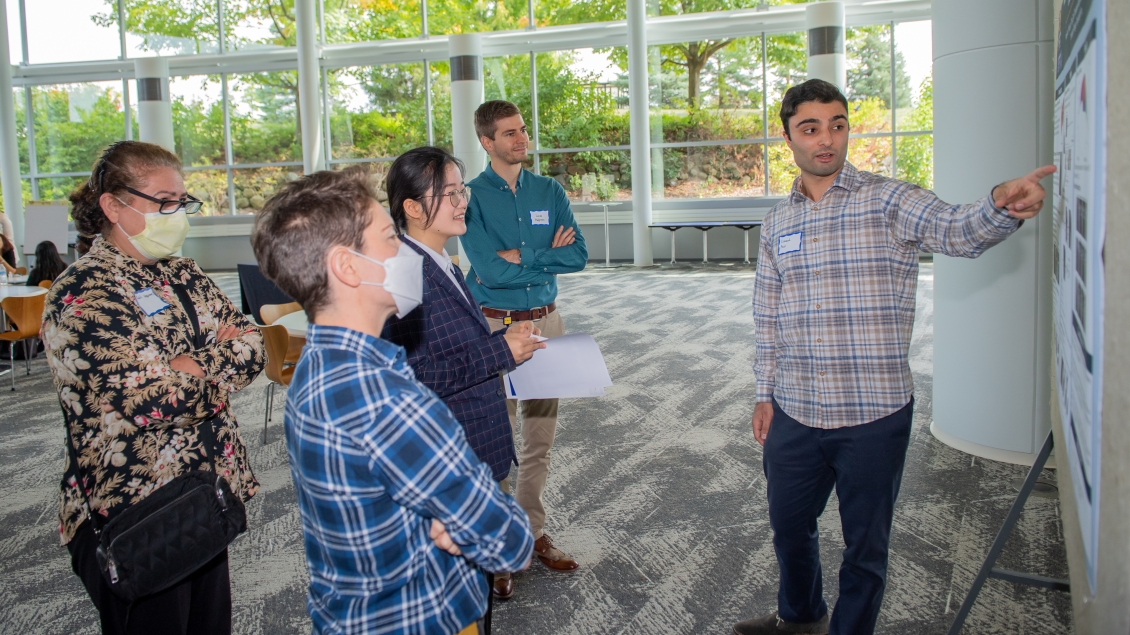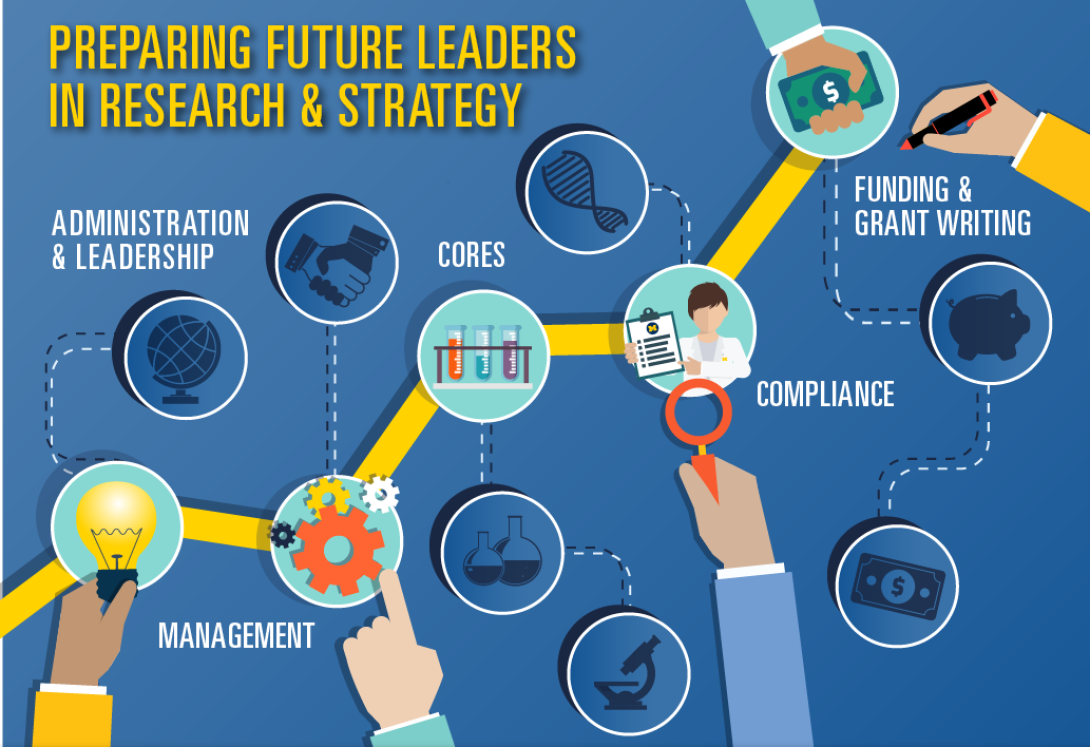
Preparing Ph.D. graduates and postdoctoral trainees in the life sciences for a successful career in research administration through a series of unit rotations, hands-on learning experiences, and direct mentorship from leaders in the field.
As the biomedical research enterprise has expanded over the last two decades, career opportunities for biomedical Ph.D.s have significantly diversified. A need for experienced leaders in academic research administration in this new career landscape has emerged, but Ph.D. graduates have had limited opportunities to actively prepare for those careers.
The Medical School Office of Research, in collaboration with the Office of Graduate & Postdoctoral Studies, offers a two-year postdoctoral training opportunity to prepare graduating doctoral students and postdoctoral trainees for a successful career in biomedical research administration. The Research Operations, Management and Strategy (ROMS) fellowship program selects highly qualified and committed participants to engage in innovative projects that enhance biomedical research at U-M. In a series of unit rotations, fellows are immersed in critical units of the UMMS Office of Research and additional partnering units at U-M to receive a hands-on learning experience and direct mentorship from leaders in the field of biomedical research.
CLICK HERE to read more about the ROMS program in American Medicine, the journal of the Association of American Medical Colleges.

The Research Operations, Management & Strategy (ROMS) Fellowship connects science and business competencies to diversify a talent pool and prepare fellows for a career in biomedical research administration. At the conclusion of the program, participating fellows will be able to demonstrate the following:
- Advanced knowledge in business principles and biomedical research operations and infrastructure
- Applied leadership and project management capabilities
- Effective oral and written communication of business concepts
- Accomplished analytical thinking and problem-solving skills
- Enhanced professional and career development strategies
The fellowship is considered a full-time job/effort. Fellows cannot participate in additional postdoctoral training, other employment, or any other fellowships while participating in this program.
The full-time, two-year program has three major components:
First Year
- Core rotations within UMMS Office of Research units
- Engage with Office of Research units that provide foundational infrastructure in a research enterprise to understand day-to-day operations, obtain training on unit-specific services, and conduct project work.
- Elective rotations with either UMMS Office of Research units or partners
- Engage with units of interest across U-M to understand day-to-day operations, obtain training on unit-specific services, and conduct project work based on individual goals.
Second Year
- Impact projects
- Build skills and experience for the next stage of your career by creating an individualized portfolio of projects from across several departments and units. Project work can be with a single unit or across several groups and can range anywhere from a couple of months in length to a year.
Fellows regularly meet with leaders, including the Program Sponsor, Program Director, and Program Manager, for professional guidance and coaching, journal club discussions, and monitoring progress in the program. Fellows should also expect to spend a minimum of two hours per week on activities related to professional competencies (e.g., seminars, conferences, online education/research, etc.).
Medical School Office of Research leadership provides operational and fiscal management for all the supporting units. Critical activities include the implementation of strategic initiatives, leading enterprise change management, and fostering collaborations with the research community across the university. Fellows will obtain an understanding of the organizational structure, leadership, and interactions among Michigan Medicine, U-M Medical School Office of Research, and partners.
Grant Services & Analysis (GS&A) serves several functions for the Medical School and Michigan Medicine. They review all grant proposals for federal and non-federal sponsors, provide pre- and post-award support, and offer proposal development services that help faculty become successful in obtaining and maintaining extramural funding. Fellows will learn key policies and regulations tied to financial grants administration while completing project work.
The Biomedical Research Core Facilities (BRCF) are centralized facilities or labs that offer shared services, shared equipment, resources, and expertise to biomedical researchers and investigators on a fee-for-service basis. Fellows will gain hands-on experience in strategic business modeling based on scientific and operational needs.
The Unit for Laboratory Animal Medicine (ULAM) is one of the nation’s oldest and most recognized programs training laboratory animal veterinarians. ULAM provides a variety of services and educational offerings to support the U-M research community and the animals under their care. Fellows will learn to understand the business of operating a major recharge unit and the partnership with the compliance arm of the Animal Care Use Program (ACUP).
Several units oversee regulatory and ethical protections of human participants and provide support for the management of studies involving human participants. The Human Research rotation allows fellows to work with units including but not limited to:
- Calendar Review & Analysis Office
The Calendar Review & Analysis Office (CRAO) assists principal investigators and study teams conducting clinical research by providing analysts and support specialists who can provide guidance on clinical research billing grids/calendars, review required core documents for alignment with Medicare and University policies, and provide clinical research billing analysts who will audit and work to have clinical research billing errors corrected. - Clinical Trials Support Office
The Clinical Trials Support Office (CTSO) is the management team for the trans-departmental Clinical Trials Support Units (CTSUs). The CTSO offers enterprise-wide standards, policies, and a common infrastructure and acts as a liaison between Principal Investigators and study teams to other partners across UM involved in clinical research. All clinical trials at U-M are supported by a CTSU. - Institutional Review Boards - University of Michigan Medical School
A component of the University of Michigan's Human Research Protection Program (HRPP), the six Institutional Review Boards of the University of Michigan Medical School (IRBMED) oversee human subjects research conducted at the Medical School and Michigan Medicine.
Fellows will learn to understand the lifecycle of a human research project including regulatory, financial, and operational components.
Below are examples of units in which previous fellows have pursued elective rotations or project work. Additional opportunities for engaging with other units outside of those below can be explored depending on each fellow’s interests.
Projects previous fellows have pursued across various units and interest areas.
- Update 5-year strategic plan. (Rogel Cancer Center)
- Analyze MM faculty experience and tenure by gender and race. (Research Intelligence and Analytics)
- Research strategic planning analysis leading to vision and mission crafting. (Department of OBGYN)
- Assist in a human research readiness assessment for a newly acquired health system. (Medical School Office of Research)
- Create a strategic plan for postdoc recruitment and retention. (Office of Graduate and Postdoctoral Studies)
- Prototype online portal to improve onboarding for new faculty. (Faculty Development Office)
- Benchmark and conduct feasibility assessment for Master's Degree program. (Unit for Laboratory Animal Medicine)
- Develop a postdoc leadership and management course. (Office of Graduate and Postdoctoral Studies)
- Develop an engaged mentoring workshop for faculty. (Office of Graduate and Postdoctoral Studies)
- Operationalize a generative AI interface to provide informational and resource support for 1st-year graduate students (Neuroscience Graduate Program)
- Promote scholarships from Blue Cross Blue Shield of Michigan for doctoral students. (Office of Development)
- Craft a web-based tool for onboarding new research administrators (Grant Services & Analysis)
- Create a workshop to enhance Team Science engagement. (MICHR)
- Analyze and refine R01 Boot Camp. (Grant Services & Analysis)
- Develop a route map and resource toolkit to support large-scale grant proposal development. (Grant Services & Analysis)
- Early program management and strategic guidance for a novel scientific program. (Medical School Office of Research)
- Operationalize and support a committee of Department Chairs to recruit and retain outstanding faculty. (Medical School Office of Research)
- Develop a program to invest in bold science initiatives in biomedical research. (Medical School Office of Research)
- Operationalize and support a committee of faculty to evaluate space utilization on an ongoing basis. (Medical School Facilities and Space)
- Assess and optimize processes related to clinical trials activation. (Clinical Trials Support Office and Calendar Review and Analysis Office)
- Develop workflows for launching clinical trials during COVID-19 and creating a COVID-19 biorepository. (Clinical Trials Support Office and Central Biorepository)
- Create an operating plan for a new academic and industry consortium in advancing research in diabetic retinal disease. (Caswell Diabetes Institute and Fast Forward Medical Innovation)
- Create utilization and performance dashboard for services. (Data Office)
- Support faculty-industry partnerships with the Business Development team. (Fast Forward Medical Innovation)
- Evaluate and create business cases for several core facilities. (Biomedical Research Core Facilities)
- Create a business plan and development strategy for a new Center. (Center for RNA Biomedicine)
Building 520, Third Floor
2800 Plymouth Road
Ann Arbor, MI 48109-2800